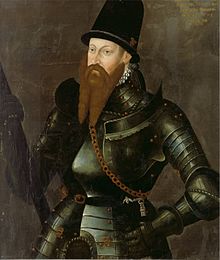Albrecht Alcibiades, Margrave of Brandenburg-Kulmbach
| Albert Alcibiades | |
|---|---|
| Margrave of Brandenburg-Kulmbach | |

Albert Alcibiades, Margrave of Brandenburg-Kulmbach
|
|
| Margrave of Brandenburg-Kulmbach | |
| Reign | 1527–1553 |
| Predecessor | Casimir |
| Successor | George Frederick |
| Born |
28 March 1522 Ansbach |
| Died | 8 January 1557 (aged 34) Pforzheim |
| House | House of Hohenzollern |
| Father | Casimir, Margrave of Brandenburg-Bayreuth |
| Mother | Susanna of Bavaria |
Albert II (German: Albrecht; 28 March 1522 – 8 January 1557) was the Margrave of Brandenburg-Kulmbach (Brandenburg-Bayreuth) from 1527 to 1553. He was a member of the Franconian branch of the House of Hohenzollern. Because of his bellicose nature, Albert during his lifetime was given the cognomen Bellator ("the Warlike"). Posthumously, he became known as Alcibiades.
Albert was born in Ansbach and, having lost his father Casimir in 1527, he came under the guardianship of his uncle George, Margrave of Brandenburg-Ansbach, a strong adherent of Protestantism. In 1541, he received Bayreuth as his share of the family lands, but, as the chief town of his principality was Kulmbach, he is sometimes referred to as the Margrave of Brandenburg-Kulmbach. His restless and turbulent nature marked him out for a military career; and having collected a small band of soldiers, he assisted Emperor Charles V in his war with France in 1543.
The Peace of Crépy in September 1544 deprived him of this employment, but he had won a considerable reputation, and when Charles was preparing to attack the Schmalkaldic League, he took pains to win Albert's assistance.
Sharing in the attack on the Electorate of Saxony, Albert was taken prisoner at Rochlitz in March 1547 by Elector John Frederick of Saxony, but was released as a result of the Emperor's victory at the Battle of Mühlberg in the succeeding April.
...
Wikipedia
